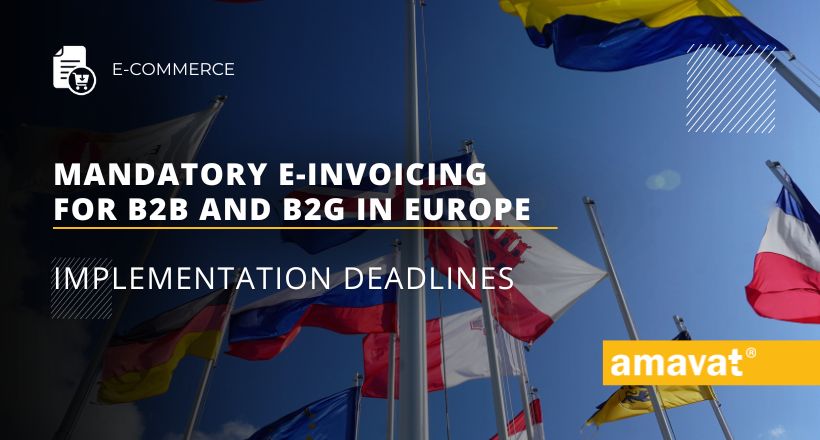Mandatory e-invoicing for B2B and B2G in Europe: Implementation deadlines
The European Union, striving to meet the challenges of the evolving digital economy, has proposed the “VAT in Digital Age” (ViDA) package. This initiative, presented by the European Commission in December 2022, aims to simplify and streamline the VAT system in the context of the modern economy. One of the key elements of this package is the introduction of mandatory e-invoicing and digital transaction reporting.
Mandatory e-invoicing in the EU
The ViDA package introduces mandatory e-invoicing for all domestic transactions within the European Union. Member states will be able to impose the requirement of issuing e-invoices without prior consent from the European Commission. Moreover, the new regulations allow for the issuance of e-invoices without needing approval from clients, which means that businesses must be prepared to accept and process them.
Implementation deadlines for mandatory e-invoicing in EU countries:
| Country | Mandatory B2B e-invoicing | Mandatory B2G e-invoicing |
|---|---|---|
| Poland | No (planned for 1.02.2026 – for companies with turnover over 200 million PLN in the previous tax year, and 1.04.2026 – for all entrepreneurs) | No (only mandatory for public administration units to receive e-invoices) |
| Germany | No (planned for 01.01.2027 – for companies with turnover over 800,000 euros, and 01.01.2028 – for all companies) | Yes |
| United Kingdom | No | No (only in the healthcare sector) |
| Austria | No | Yes |
| France | No (planned for 01.09.2026 – for large and medium enterprises, and 01.09.2027 – for small and micro enterprises) | Yes |
| Czech Republic | No | No |
| Spain | No (implementation planned for 01.06.2025 at the earliest) | Yes |
| Italy | Yes | Yes |
| Netherlands | No | Yes |
| Romania | Yes | Yes |
| Sweden | No | Yes |
| Hungary | No (but there is a requirement for real-time invoice reporting – RTIR) | No |
| Lithuania | No | Yes |
| Slovakia | No | No |
| Belgium | No (planned for 01.01.2026) | Yes |
| Bulgaria | No | No |
| Croatia | No (planned for 01.01.2026) | Yes |
| Cyprus | No | Yes |
| Denmark | No | Yes |
| Estonia | No | Yes |
| Finland | No | Yes |
| Greece | No | Partially (full implementation planned for 01.01.2025) |
| Ireland | No | No |
| Luxembourg | No | Yes |
| Latvia | No (implementation planned by the end of 2025) | No (implementation planned by the end of 2025) |
| Malta | No | Yes |
| Portugal | No | Yes (for micro, small, and medium enterprises from 01.01.2025) |
| Slovenia | No | Yes |
| Switzerland | No | Yes |
E-invoicing implementation timeline
2024: After the adoption of the ViDA package, businesses will need to quickly adapt to the new e-invoicing requirements. Member states will be able to introduce mandatory e-invoicing for domestic transactions as early as 20 days after the regulations are published in the Official Journal of the EU, without needing additional approval from the EU.
2030: All entrepreneurs engaged in transactions subject to digital reporting requirements will be required to issue invoices in electronic form. The new regulations mandate the use of structured invoices compliant with the European e-invoicing standard (EN16931). The deadline for issuing an electronic invoice will be extended to 10 days from the date of the transaction.
The significance of e-invoicing
The introduction of mandatory e-invoicing across the European Union aims not only to modernize the tax system but also to improve the efficiency and transparency of VAT collection. E-invoicing provides:
- Increased transparency: Enables real-time transaction tracking, reducing the risk of tax fraud.
- Simplified processes: Automation of invoice issuance and processing reduces administrative burdens for businesses.
- Cost savings: Reduces costs associated with traditional paper invoice issuance and eliminates human errors.
Summary
E-invoicing is a key element of the ViDA package, aimed at aligning the VAT system with the requirements of the contemporary digital economy. The implementation schedule for these changes is ambitious but necessary to meet the challenges of the modern economy. Entrepreneurs should closely monitor legislative developments and prepare in advance for the upcoming changes to seamlessly adapt to the new tax requirements. The introduction of ViDA is a significant step towards simplifying and improving the tax system, which is crucial for the further economic development of the European Union.





